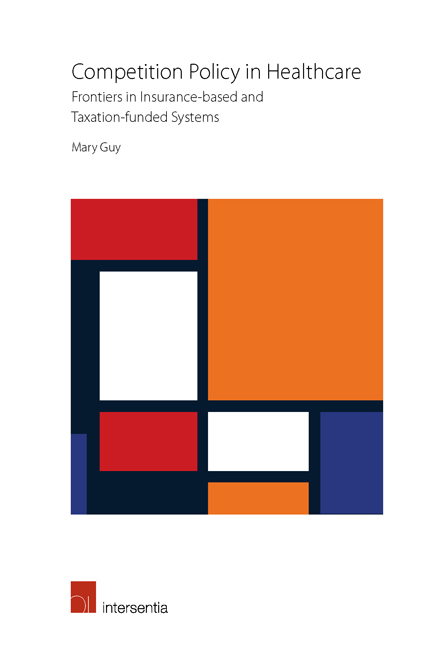Book contents
- Frontmatter
- Foreword
- Preface
- Acknowledgements
- Contents
- List of Cases
- List of Legislation
- Table of Figures
- Abbreviations
- Introduction
- Chapter 1 Competition Reforms in Dutch and English Healthcare and the Development of Competition Policy
- Chapter 2 Competition Law: Its Applicability and Application in Dutch and English Healthcare
- Chapter 3 Sectoral Regulation: The Relationship between the Competition Authority and the Healthcare Regulator in the Netherlands and England
- Chapter 4 Merger Control: Hospital Mergers, General Merger Control and the Development of ‘Healthcare-Specific’ Merger Control in the Netherlands and England
- Conclusion
- Bibliography
- Index
- About the Author
- Frontmatter
- Foreword
- Preface
- Acknowledgements
- Contents
- List of Cases
- List of Legislation
- Table of Figures
- Abbreviations
- Introduction
- Chapter 1 Competition Reforms in Dutch and English Healthcare and the Development of Competition Policy
- Chapter 2 Competition Law: Its Applicability and Application in Dutch and English Healthcare
- Chapter 3 Sectoral Regulation: The Relationship between the Competition Authority and the Healthcare Regulator in the Netherlands and England
- Chapter 4 Merger Control: Hospital Mergers, General Merger Control and the Development of ‘Healthcare-Specific’ Merger Control in the Netherlands and England
- Conclusion
- Bibliography
- Index
- About the Author
Summary
How a nation manages healthcare provision is a mark of its civilisation. Since resources are always finite, the best of intentions requires the management of processes and allocations. How best to proceed is a question that continues to receive varying answers and continual refinements in policy and legal frameworks. The development of competition policy is but one example of this.
An initial stimulus for my research in this area arose from the confidence evident in claims that competition policy could work in the English National Health Service (NHS) as in other sectors of the economy. Was it really that simple, was my first response. Many more questions followed. To what extent could such comparisons work, and what could they usefully prove? Are there complexities attached to the NHS (or healthcare generally) which need to be explored? If the devil is indeed in the detail, surely that is where we should look. How did we get to where we are? Could elucidation be found by examining the attempts being made to introduce competition policy into another healthcare system?
These last two questions seemed especially promising if we are to understand the issues of developing competition in healthcare and move beyond polarised claims of competition being exclusively “good” or “bad” for healthcare reform. Despite the obvious distinction between taxation-funded and insurance-based system models, the Netherlands provided an obvious comparison in view of the common features of the organising principle of solidarity and the underlying EU competition law framework (the development of Brexit notwithstanding).
What has emerged from my doctoral research and subsequent updates for this book is an understanding of the English reforms in light of the Dutch experience, and considerations for the development of competition policy in healthcare. This book therefore provides comprehensive insight into how the operation of general competition law, merger control and sectoral regulation has developed over the first years following the introduction of mandatory private health insurance in the Netherlands in 2006, and the restructuring of the English NHS by the Health and Social Care Act 2012. This contribution is intended to facilitate future discussion both within the Academy and beyond. Over the course of writing this book, various agencies have undergone changes, including with regard to their name.
- Type
- Chapter
- Information
- Competition Policy in HealthcareFrontiers in Insurance-based and Taxation-funded Systems, pp. ix - xPublisher: IntersentiaPrint publication year: 2019

